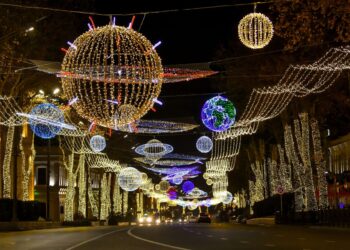For 21 years, the Art Gene Fest has targeted younger audiences to introduce them to traditional Georgian culture handed down from generation to generation. According to festival representatives, the playing field between folklore and modern music has become smaller in recent years, as people become more interested in traditional tunes.
The festival runs over two weekends this year, from July 19-21 and July 26-28. Art Gene not only promotes Georgian culture through song, but also through culinary displays, art, choreography, and other activities. The event organizer, Solomon Gogashvili, said the festival covers everything in and around Georgia, and is designed to present folklore music during the day, and modern Georgian artists at night, so younger people are interested and come out for the concerts. The variety of modern music is large, encompassing reggae, electronic, and more, giving it drive, but Gogashvili explains how, after the first weekend of the festival, they have noticed more people showing up for the folk music.
“The first act we used as ‘bait,’ because we knew folk music doesn’t have as many listeners as modern,” Gogashvili tells GEORGIA TODAY. “That’s why we have folklore during the day and during the evening switch to modern music, but we’re seeing a growing balance in interest for both.”
The festival was founded in 2003, when the creators realized there was a gap in the attention given to traditional Georgian culture. Gogashvili told us how, during the 90s, there wasn’t anything like it- music and exhibitions highlighting Georgia ‘in an open space and under the open sky.’ He said the fest originally started as a family ensemble, then grew in scale, hitting a peak in 2007 and 2008.
According to Gogashvili, the festival’s name is a play on words as a way to combine people and the arts.
“The ‘Art Gene’ name was decided by the founders 21 years ago. Georgians are in their genetics artistic people, and our ethnic music is really genius,” Gogashvili tells us. “That’s why we decided on the name ‘Art Gene’.”

The festival occurs near different historical monuments throughout Georgia each year, where not many large-scale events are held. In Tbilisi, it is held at the Ethnography Museum, an open-air territory above the Vake district near Turtle Lake, which presents old houses from 14 ethnographic zones of Georgia.
The museum’s goal is to provide information about Georgian folk culture through tours and sights. It takes up 52 hectares of land and boasts more than 8000 artifacts from around the country. Gogashvili said the museum doesn’t receive much traction or have many live events, so they decided it would be a good spot to hold the festival.
During its first weekend in Tbilisi this year, solo performer Vladimer Chaladze performed at Art Gene with his band ‘Chveneburebi’. He said he joined the band in 2003, and their core focus is creating and singing family music. He says there is a need to share the Georgian culture and keep people entertained.
“The responsibility is very high, especially when there are many listeners,” Chaladze claims. “We seek to please them with our music. We have our compositions, but also try to give them new experiences.”
Various performers, both folk and modern, are performing at this year’s festival. Guests from regions of Georgia including Samegrelo, Mskheta, Svaneti, Samachablo, Adjara, Racha, Guria, and many more, are giving folk performances during the day. Then, in the evening, popular Georgian artists such as ‘Reggaeon’, ‘Sukhishvili’, ‘Nino Katamadze’, ‘Insight’, and others will take to the stage.
The last night in Tbilisi will end on July 28, with the Georgian band ‘33A’, famously known for their songs ‘Galaktioni’ and ‘Dromale’.
Gogashvili said Art Gene calls their tours ‘regional expeditions,’ seeing them traveling to different corners of the country. This year, the festival started in Zestafoni, Tskhratkharo village, on July 14, before coming to Tbilisi for two weekends. It will conclude in Dmanisi, at Pantiani Lake, on August 3, where it has ended for the last few years. The first and last cities are free entry, but the main event that is held in different places each year is ticketed.
Even though the festival is held just once a year, Gogashvili explains how Art Gene carried out year-round activities, expeditions, and filming.
“The festival is international and open to Georgians and tourists alike, so everyone can learn and experience the country’s growing folklore culture,” he says.
By Shelbi R. Ankiewicz














